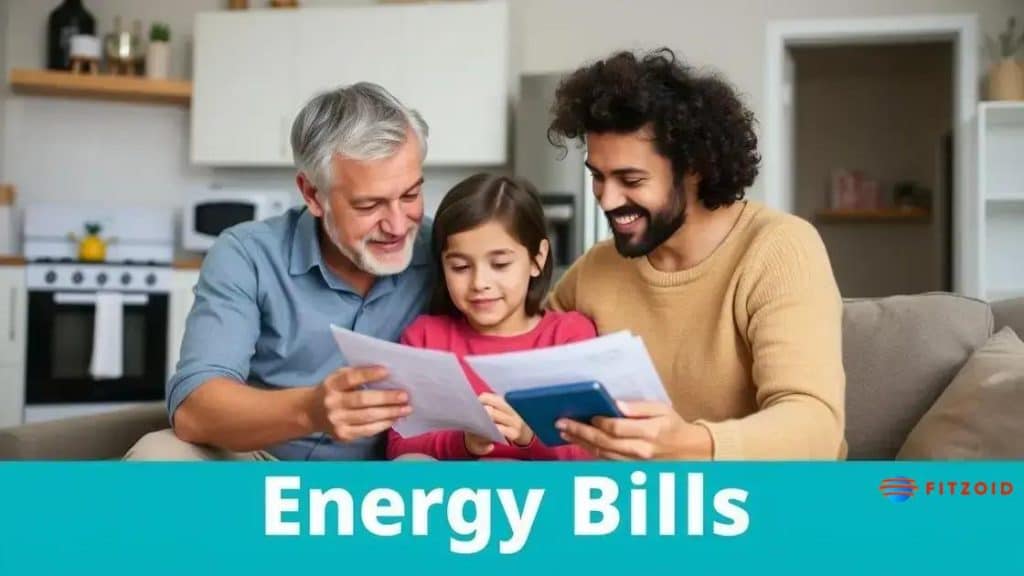Energy bills help you save money efficiently

Anúncios
Energy bills can be reduced by understanding your charges, using energy-efficient appliances, participating in government programs, and implementing smart home solutions for better energy management.
Energy bills help you understand your home’s efficiency and cut unnecessary costs. Curious about how to reduce these expenses? In this article, we’ll uncover practical tips and strategies to help you save money while staying comfortable in your living space.
Anúncios
Understanding your energy bills
Understanding your energy bills is crucial to managing your household expenses effectively. When you open your energy bill, it can seem overwhelming. However, once you break down the charges, you’ll see where your money is going and how you can make informed changes.
What’s Included in Your Energy Bill?
Your energy bill typically includes various components that contribute to the total amount you owe. Each part serves a specific purpose and helps you understand your consumption:
Anúncios
- Base Charge: This is a fixed fee that covers your account and service connection.
- Energy Supply Charge: This is the cost of the electricity you use, measured in kilowatt-hours (kWh).
- Delivery Charge: This fee covers the costs of delivering electricity from power plants to your home.
- Taxes and Fees: Additional charges imposed by your local government or utility company.
By understanding these components, you can begin to analyze your energy habits. Are you using too much electricity during peak hours? Are there ways to reduce your base charge? Small adjustments can lead to savings over time.
How to Analyze Your Consumption
Once you know what makes up your bill, it’s time to take a closer look at your consumption patterns. Monitor your usage to identify any trends:
- Check your usage compared to previous months and seasons.
- Look for spikes in usage and consider what may have caused them.
- Identify high-usage appliances and consider energy-efficient alternatives.
By doing this, you can make smarter choices about how you use energy. Consider using smart plugs or monitoring devices that track real-time usage.
Energy efficiency also plays a major role in reducing your bill. Simple changes such as switching to LED bulbs, unplugging devices when not in use, and utilizing programmable thermostats can make a significant difference.
Overall, becoming familiar with your energy bill not only helps in identifying savings but also promotes responsible energy use. The more you know, the better equipped you are to manage costs and improve efficiency. Remember, every little bit helps!
Ways to reduce energy consumption

Reducing energy consumption is essential for both saving money and promoting environmental sustainability. By being mindful of how you use energy in your home, you can lower your utility bills while contributing to a greener planet.
Simple Steps to Lower Energy Use
There are various everyday actions you can take to decrease your energy usage. Small changes can add up over time, leading to significant savings.
- Switch to LED Bulbs: Traditional incandescent bulbs consume more energy. LED bulbs last longer and use about 75% less energy.
- Unplug Devices: Many electronics continue to use power even when not in use. Unplugging devices or using a power strip can help.
- Use Energy-Efficient Appliances: Look for appliances with the ENERGY STAR label, which indicates better energy efficiency.
- Adjust Your Thermostat: Setting your thermostat a few degrees lower in winter and higher in summer can lead to major energy savings.
Additionally, it’s important to examine your home’s insulation. Proper insulation keeps the heat in during winter and the cool air in during summer, reducing the need for heating and cooling systems. You can also seal any drafts around windows and doors to improve efficiency.
Consider Smart Technology
Smart home devices can also play a key role in reducing energy consumption. For example, smart thermostats learn your preferences and optimize your heating and cooling schedules. Smart plugs can help you monitor and control devices remotely, ensuring you only use energy when needed.
Planting trees or shrubs around your home can help shade your house in the summer, minimizing the need for air conditioning. In winter, they can serve as windbreaks, reducing heating costs. Every small step you take not only impacts your energy bills but can also contribute to a healthier planet.
Lastly, staying informed through your energy provider’s resources can help you understand your usage better and keep up with new energy-saving technologies. By implementing some or all of these strategies, you can significantly reduce your energy consumption and enjoy lower bills!
The impact of energy efficiency on bills
The impact of energy efficiency on your bills is profound and can lead to substantial savings over time. By making energy-efficient choices, not only do you reduce your monthly costs, but you also contribute to a healthier environment.
How Energy Efficiency Saves You Money
Implementing energy-efficient practices and technologies can significantly lower your energy bills. The more energy you save, the less you pay. Here are a few ways energy efficiency impacts your finances:
- Lower Energy Consumption: Energy-efficient appliances use less electricity, which directly reduces your monthly utility bills.
- Rebates and Incentives: Many utility companies offer rebates for purchasing energy-efficient products, making the initial investment more affordable.
- Increased Property Value: Homes with energy-efficient upgrades can sell for more, as buyers are often willing to pay extra for lower operating costs.
- Reduced Maintenance Costs: Energy-efficient systems often come with warranties and require less maintenance, saving you money in repairs.
When you choose energy-efficient options, you are taking proactive steps to manage your budget. For example, installing energy-efficient windows can keep your home cooler in the summer and warmer in the winter, lowering heating and cooling costs.
Environmental Benefits of Energy Efficiency
Besides saving money, energy efficiency also reduces your carbon footprint. Lower energy consumption means fewer resources are used and less pollution is released into the atmosphere. This not only benefits your wallet but also helps the planet.
Investing in energy-efficient upgrades is a wise decision for both economic and environmental reasons. You’ll notice the effects on your energy bills quickly after implementing these changes, and you’ll be contributing to a sustainable future.
Furthermore, energy-efficient communities often have better air quality due to decreased emissions from power plants. This means healthier living conditions for everyone.
Smart home solutions to lower costs

Smart home solutions are becoming increasingly popular for those looking to lower energy costs. By incorporating technology into your everyday routines, you can optimize energy usage and save money.
Benefits of Smart Home Technology
There are several key benefits to using smart home solutions. These devices help you monitor and control your energy consumption effectively. Here are some highlights:
- Remote Control: Smart devices can be controlled remotely via your smartphone, allowing you to adjust settings when you’re not home.
- Automated Scheduling: You can set schedules for your devices, ensuring they operate only when needed, which saves energy.
- Real-Time Monitoring: Many smart devices provide real-time energy usage feedback, helping you identify areas for improvement.
- Enhanced Security: Some smart home products enhance security, which can prevent energy loss through windows and doors.
Using smart thermostats is an excellent way to manage heating and cooling efficiently. These devices learn your preferences and adjust accordingly, often saving users up to 15% on energy bills.
Popular Smart Devices for Energy Savings
There are various smart home devices that can contribute to energy savings. Consider investing in the following:
- Smart Plugs: These allow you to monitor and control appliances remotely, helping to eliminate wasteful energy use.
- Smart Light Bulbs: They can be set to dim or turn off automatically and can be controlled via apps.
- Smart Thermostats: They optimize heating and cooling schedules based on your habits.
- Smart Sensors: Use these to detect movement or temperature changes, assisting in efficient energy management.
Integrating these smart solutions into your home can lead to noticeable reductions in your energy bills. They not only provide convenience but also empower you to take control of your energy use and make informed decisions.
Additionally, smart home technology often enhances the comfort of your living environment. With tailored settings and automation, you can create a personalized atmosphere that suits your lifestyle.
Government programs to support energy savings
Government programs to support energy savings are essential in helping households reduce their utility bills. These initiatives aim to promote energy efficiency and offer financial assistance to those making energy-saving upgrades.
Types of Government Programs
Various programs exist at local, state, and federal levels. They often provide incentives such as rebates, tax credits, or grants for energy-efficient improvements. Here are some common types of programs:
- Rebate Programs: Many utilities offer rebates for purchasing energy-efficient appliances, windows, and insulation.
- Tax Credits: Certain energy-saving improvements may qualify for tax credits, reducing your taxable income.
- Grants: Some organizations provide grants for low-income households to support energy efficiency upgrades.
- Energy Audits: Government-funded audits can help identify areas of improvement and suggest solutions tailored to your home.
These programs not only lessen the financial burden on households but also encourage environmentally friendly practices. By taking advantage of these initiatives, you can make informed decisions about improving energy efficiency.
How to Access These Programs
Accessing these programs is often straightforward. You can start by visiting your local utility company’s website to find out what they offer. Additionally, checking with your state’s energy office or government website can provide valuable information on available programs.
Online tools can also help you find incentives specific to your area. Staying informed about deadlines for applications and eligibility requirements is crucial, as these details can vary widely.
Participating in government programs can lead to significant savings, making energy-efficient upgrades more attainable. It’s an effective way to improve your home’s efficiency while contributing to a greener future.
With the right information and resources, you can enjoy the benefits of lower energy bills and comfort in your home.
In conclusion, taking steps to manage and reduce your energy consumption can lead to significant savings on your energy bills. By understanding your bills and exploring energy-efficient options, you can make a positive impact on both your finances and the environment. Utilizing government programs and smart home solutions can further enhance your ability to save energy and lower costs. Remember, even small changes can lead to great rewards in terms of savings and sustainability!
FAQ – Frequently Asked Questions about Energy Bill Savings
How can understanding my energy bill help me save money?
By breaking down the charges on your energy bill, you can identify areas where you might be overspending and make informed adjustments to your energy usage.
What are some effective ways to reduce my energy consumption?
You can reduce your energy consumption by using energy-efficient appliances, unplugging devices when not in use, and adjusting your thermostat settings.
Are there government programs available to help with energy savings?
Yes, many local and federal programs offer rebates, tax credits, and grants for making energy-efficient upgrades to your home.
What smart home devices can help me lower my energy bills?
Devices like smart thermostats, smart plugs, and smart light bulbs can help monitor and control your energy usage effectively, leading to cost savings.





